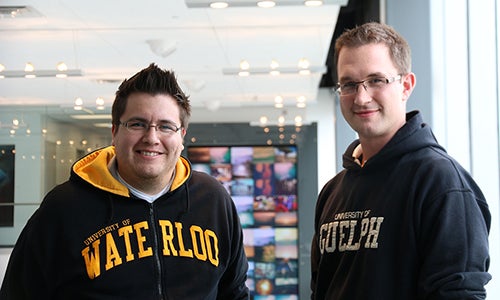
Waterloo student wins national hackathon
Digital media grad student hacks big government data to create new app that helps immigrants to Canada

Digital media grad student hacks big government data to create new app that helps immigrants to Canada
By Megan Scarborough Faculty of Arts
Hacking government files and helping people usually don’t go together.
But that’s exactly what Carlos Saavedra and his partner did when they built newRoots - an app that matches new immigrants with Canadian cities that offer the greatest opportunity for success.
Saavedra, a student in Waterloo’s Master of Digital Experience Innovation program on the Stratford Campus, won the first Canadian Open Data Experience, a 48-hour hackathon that challenged participants to create an application that would better the lives of Canadians.
Saavedra and his partner, Jason Ernst, a computer science PhD student at the University of Guelph, call their team Electric Sheep. They were among 15 finalists who pitched their app in front of panel of business and government leaders. The Honourable Tony Clement, President of the Treasury Board, awarded the team the $25,000 top prize, provided by Open Text, along with an extra $1000 ‘fan favourite’ bonus prize.
App asks immigrants about skills and climate preference
The newRoots app asks users to complete a short survey with questions about skills, industry, income expectations and climate preference. A list of the top five cities in Canada that best match their desired career and lifestyle is generated by the app.
“We wanted to make sure that new Canadians have the best opportunity for success and are able to get on their feet as quickly as possible,” said Saavedra.
Waterloo student inspired by his immigrant parents
The idea for the app was inspired by his parents. His mom came to Canada from Poland and his dad from Ecuador. Like many new immigrants, they had a difficult time acclimating to life in Canada.
Electric Sheep will be launched as a startup in Kitchener-Waterloo and the team plan to use the prize money to bolster the app’s speed and functionality. They hope to release the fully-featured online application within months.
Waterloo’s Stratford campus hosted hackathon
The University of Waterloo Stratford Campus was host to one hub. Once the apps were built and submitted, the judges selected the top 15 for the CODE grand finale on March 28th.
Hilary Mason, renowned data scientist and speaker at the University of Waterloo Stratford Campus’ CODE 2014 Inspiration Day, credits ‘hackers’ with the ability to play – “to know how to go from the data you have to an interesting question that is relevant.”

Read more
With AI, manufacturing and green tech-focused companies, Waterloo-linked innovators are scaling businesses for global impact

Read more
GreenHouse awards $10,000 to student ventures and changemakers aiming to transform livelihoods within disadvantaged communities

Read more
Meet the five exceptional graduate students taking the convocation stage as Class of 2024 valedictorians
The University of Waterloo acknowledges that much of our work takes place on the traditional territory of the Neutral, Anishinaabeg, and Haudenosaunee peoples. Our main campus is situated on the Haldimand Tract, the land granted to the Six Nations that includes six miles on each side of the Grand River. Our active work toward reconciliation takes place across our campuses through research, learning, teaching, and community building, and is co-ordinated within the Office of Indigenous Relations.